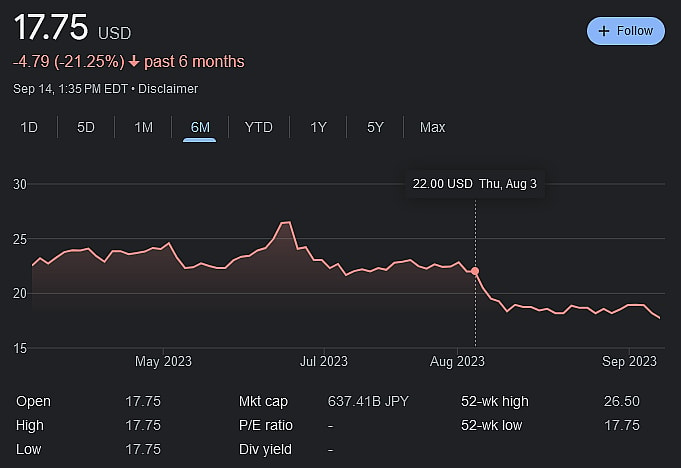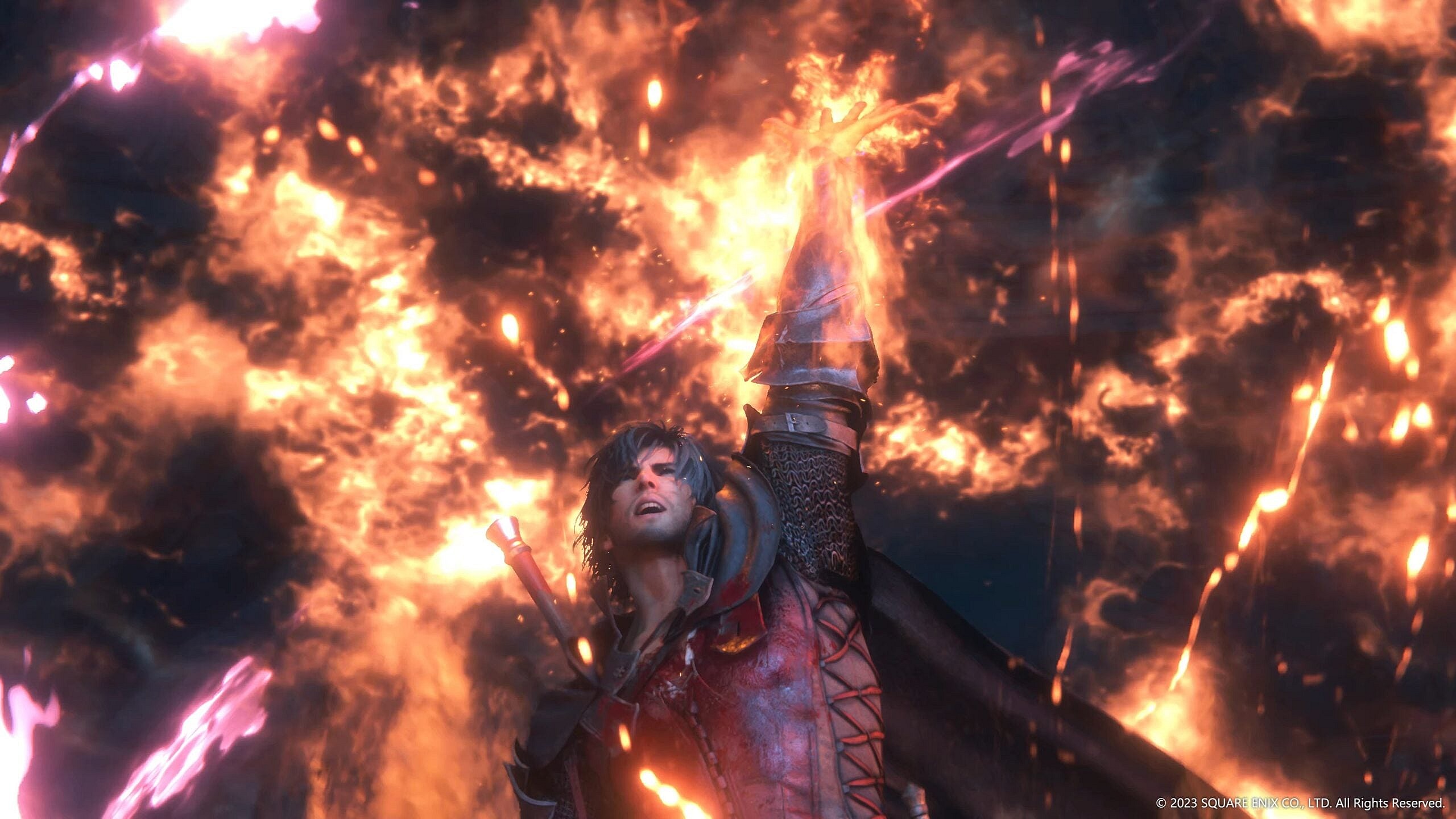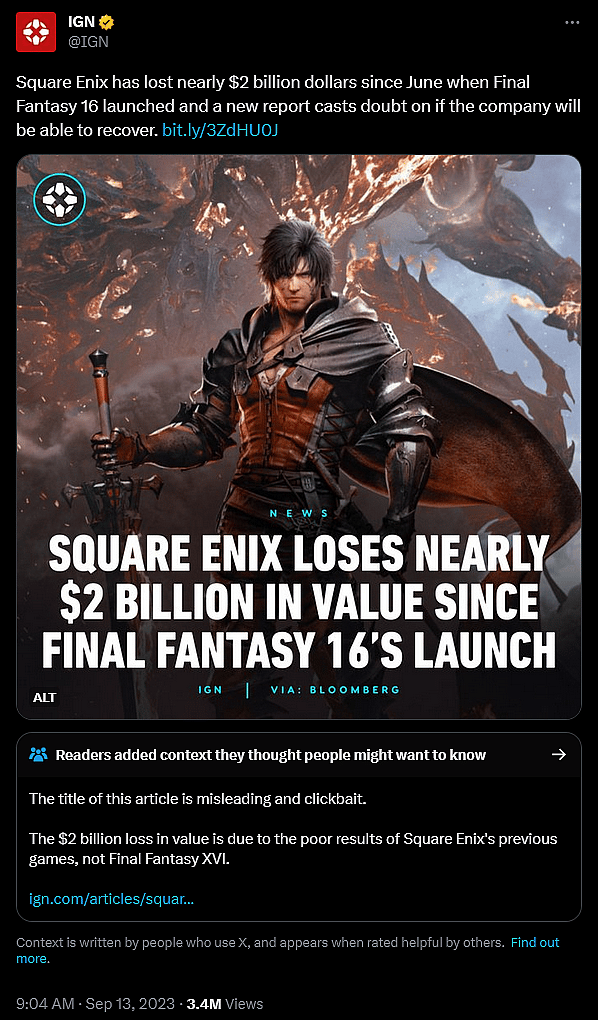Western Video Game Journalists Disingenuously Attempt To Blame Recent Square Enix Financial Losses On ‘Final Fantasy XVI’, Ignore Impact Of Failures Of ‘Forspoken’ And ‘Marvel’s Avengers’

Seemingly intent on proving that Western entertainment journalists do in fact hold some form of widespread contempt for any and all things Japanese, rather than admit that Forspoken and Marvel’s Avengers caused more damage to the company than analysts could have imagined, two prominent video game industry-related news outlets have attempted to blame Square Enix’s recent final struggles on what they describe as a ‘middling’ reception to Final Fantasy XVI.

As detailed in their Consolidated Financial Results for the Three-Month Period Ended June 30, 2023, during said time frame the developer pulled in a total profit of ¥6,305 million JPY.
Unfortunately for the company’s board and its investors, this performance was shockingly poor compared to the same period in 2022, at which time Square Enix’s total profit amounted to ¥18,359 million JPY.

Following their public release of this information on August 4th, Square Enix’s stock price took a massive hit, with shares having dropped a full $2 US from $25 USD apiece to just $23 USD by day’s end.
And things only got worse from there, as in the roughly six weeks since they published their financial details, not only has Square Enix’s stock failed to find its way back to its pre-Q1 2024 earnings report level, but it’s continued to decline even further.
As of September 14th, the developer’s stock is trading at just $17.75 USD.

However, as noted by Square Enix themselves in their own financial reporting, Final Fantasy XVI release played no role in the company’s falling profit lines, but rather helped the company’s “HD (High-Definition) Game sub-segment’s net sales for the three-month period ended June 30, 2023 [rise] compared to the same period of the previous fiscal year.”
Rather, per the company’s previous Q3 2023 earnings report, the developer’s lower profits in recent months are to blame on the fact that newer releases such as Crisis Core -Final Fantasy VII- Reunion, Forspoken, and Octopath Traveler II “generated fewer earnings than in the previous year”.
Further, Square Enix noted that their ongoing financial woes were exacerbated by the twin facts that “Net sales declined versus the previous fiscal year in the MMO (Massively Multiplayer Online) Game sub-segment, in part because of the lack of any expansion pack launches for FINAL FANTASY XIV” and “The Games for Smart Devices/PC Browser sub-segment saw a decline in net sales versus the previous fiscal year because of weak performances by existing titles.”

Yet, despite Square Enix having made it very clear that they considered the franchise’s latest numbered entry to be a boon to their bank accounts rather than a burden, both Bloomberg and IGN chose to frame the company’s current situation as being exclusively the result of what they consider Final Fantasy XVI’s under-performing sales.
Adorning their coverage of the matter with a photo of a Final Fantasy XVI in-store promotional display, the former’s Takashi Mochizuki and Kotaro Hara declared, “Square Enix Holdings Co. has shed nearly $2 billion of its value since Final Fantasy XVI, the latest installment of its global hit series, came out to mixed reviews.

“The game’s sales underwhelmed, and things got worse in August after the company reported a sharp profit decline,” they then claimed, clearly unable to provide any concrete link between the two developments and instead leaving their readers responsiblke to make that connection themselves.
“Shares plummeted by double digits [This appears to be a wild exaggeration, as according to Google’s own summary of Square Enix’s stock performance history, it has only lost $8.75 in value since the financial report], a dozen analysts tracking the stock cut their price target and long-term investor Sumitomo Mitsui Trust Asset Management Co. slashed its holdings in the game company.”

However, the only parties to attribute specific blame for Square Enix’s ‘shedding of value’ were Mochizuki and Hara themselves.In fact, of the individuals reached for comment on the stock’s performance, only one consultant, former GRAVITY GAME ARISE, Co. Ltd staff member Michael Prefontaine, attributed responsibility for the decline to any specific titles: Marvel’s Avengers, Forspoken and The DioField Chronicle.
“Flooding the market with unfinished, bad or untested games is a bad move,” he explained, making no mention of Clive Rosfield or his quest across Valisthea. “The company has overstretched itself on too many titles without proper oversight.”

Meanwhile, running with a similarly sensationalist take on the news, IGN published a summary of Bloomberg’s report headlined, “Square Enix Loses Nearly $2 Billion in Value Since Final Fantasy 16“.
“Shares in the company have plummeted nearly 30% since Final Fantasy 16 came out on June 22, closing on September 13 at their lowest point since May last year,” outlet reporter Wesley Yin-Poole insisted, who offered no supporting evidence and appeared to be simply regurgitating Bloomberg’s read of the situation.

Notably, Yin-Poole falsely asserts to IGN readers that “analysts told [Bloomberg] that Final Fantasy 16 failed to make up for the poor performance of previous Square Enix flops, such as Marvel’s Avengers and Forspoken, and mobile games that were shut down soon after launch.”
As read above, not only was it just a single analyst, Prefontaine, who made pointed mentions of these two titles, but at no point did he ever state or even imply that Final Fantasy XVI was meant to directly ‘make up’ for either games’ poor sales.
Rather, this appears to be Yin-Poole’s own attempt to blame the Action-RPG for the failure of Square Enix’s foray into Western-style video games.

IGN would double-down on this framing in sharing the story to Twitter, scrawling the very vague headline “Square Enix Loses Nearly $2 Billion In Value Since Final Fantasy 16’s Launch” across a large image of Clive himself.
Thankfully, IGN would be called out on their dishonesty by Twitter’s Community Notes users, who attached one such note to the video game news outlet’s original post which clarified, “The title of this article is misleading and clickbait. The $2 billion loss in value is due to the poor results of Square Enix’s previous games, not Final Fantasy XVI.”

